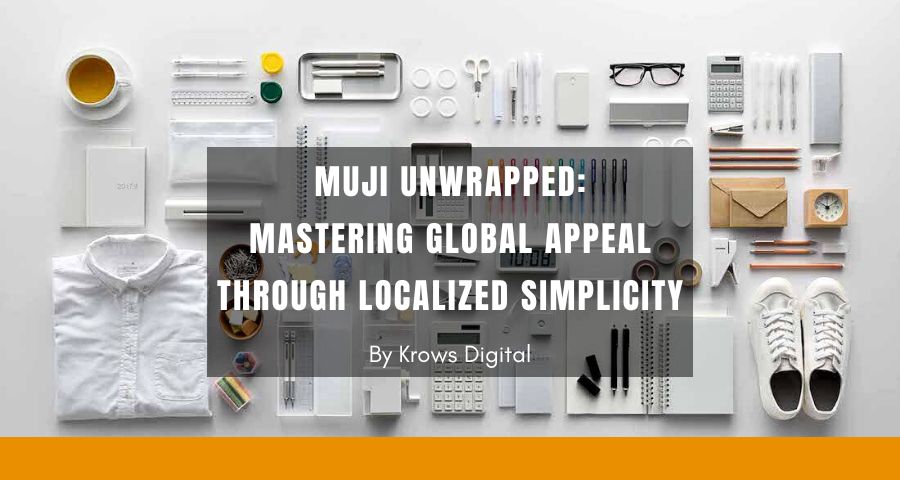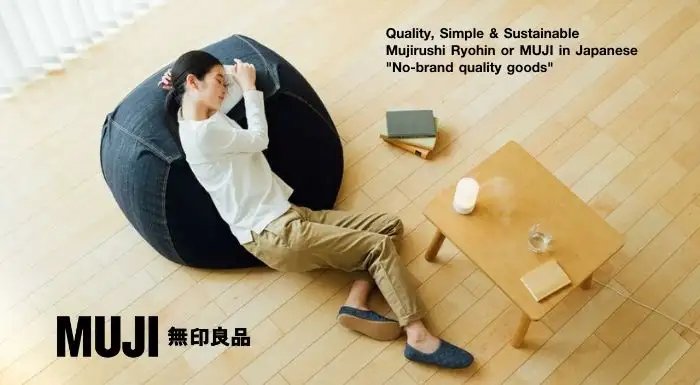
MUJI, short for 'Mujirushi Ryohin' meaning 'no-brand quality goods', represents a paradigm shift in branding that emphasizes minimalism and intrinsic value over flashy logos and aggressive marketing. This article explores how MUJI's philosophy of simplicity, quality, and sustainability has redefined global branding and influenced consumer behavior worldwide.
Core Principles of MUJI’s Identity
Simplicity
At the heart of MUJI's identity lies its commitment to simplicity. This approach is not just about aesthetic minimalism but also about usability and accessibility. MUJI's products transcend cultural and linguistic barriers, making them appealing to a global audience.
Quality
Despite the lack of visible branding, MUJI's products are renowned for their quality. Each item showcases superior craftsmanship, utilizing high-quality materials and adhering to stringent manufacturing standards. This focus on quality ensures longevity and customer satisfaction.
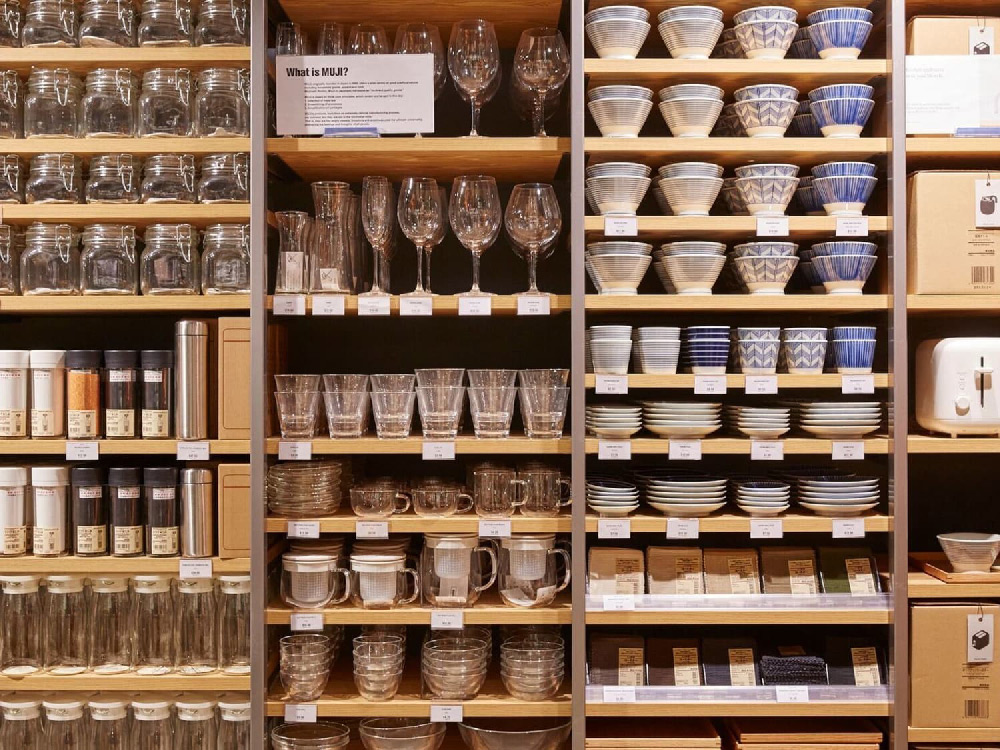
Sustainability
MUJI is a pioneer in promoting sustainability. From using eco-friendly materials to designing products that minimize waste, MUJI encourages its customers to lead more environmentally conscious lives.
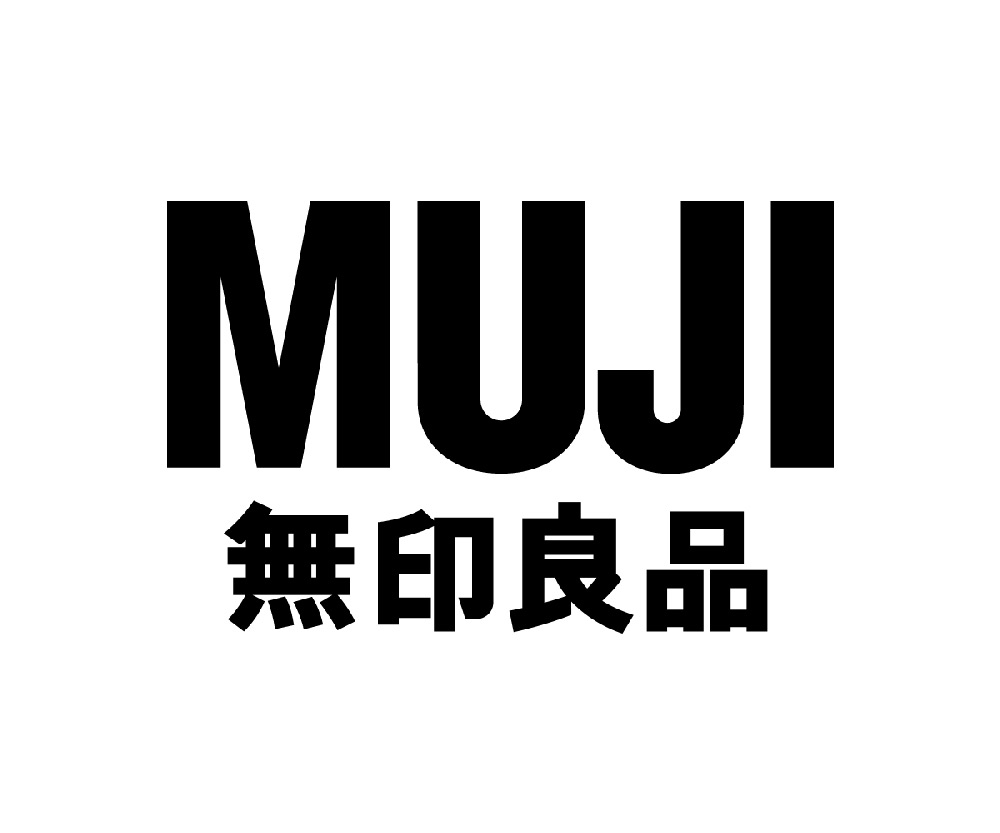
Philosophical Marketing: A Quiet Communication
MUJI’s marketing strategy is as minimalist as its products. By forsaking conventional advertising, MUJI opts for a subtler approach, focusing on product quality and store aesthetics to communicate its values. This method not only distinguishes MUJI in a saturated market but also fosters deeper consumer connections.
Consumer Education and Engagement
MUJI excels in consumer engagement through education. By detailing the philosophy and sustainability practices behind its products, MUJI enhances customer appreciation and fosters brand loyalty, particularly among consumers who value ethical consumption.
Brand Loyalty and Cultural Impact
MUJI has cultivated a broad and diverse following by consistently adhering to its core principles. Its impact extends beyond typical consumer demographics, influencing the global design and retail industries and demonstrating the cultural power of its brand philosophy.

Beyond Retail: MUJI as a Lifestyle
MUJI's influence stretches further into promoting a lifestyle of mindfulness and minimalism. From stationery to furniture, each product category is infused with MUJI’s philosophy, appealing to consumers who seek harmony and simplicity in their daily lives.
Product Philosophy: Simplicity and Sustainability
MUJI’s products emphasize functionality and environmental responsibility. This dual focus not only meets aesthetic and practical needs but also supports sustainable living, making MUJI a leader in eco-friendly retail.
Materials and Manufacturing
MUJI's commitment to sustainability is evident in its use of recycled materials like organic cotton and reclaimed wood. These choices reflect MUJI's dedication to reducing its ecological footprint while maintaining product durability and appeal.
Global Strategy: Localization with a Universal Appeal
MUJI’s global strategy expertly balances localization with its overarching branding principles. By adapting products to meet local needs while preserving its core identity, MUJI successfully engages with diverse markets worldwide.
Tailored Product Offerings
MUJI adjusts its offerings to resonate with local tastes without compromising its design philosophy. For example, it tailors its product lines from East Asia to Europe, ensuring relevance and enhancing consumer connection.
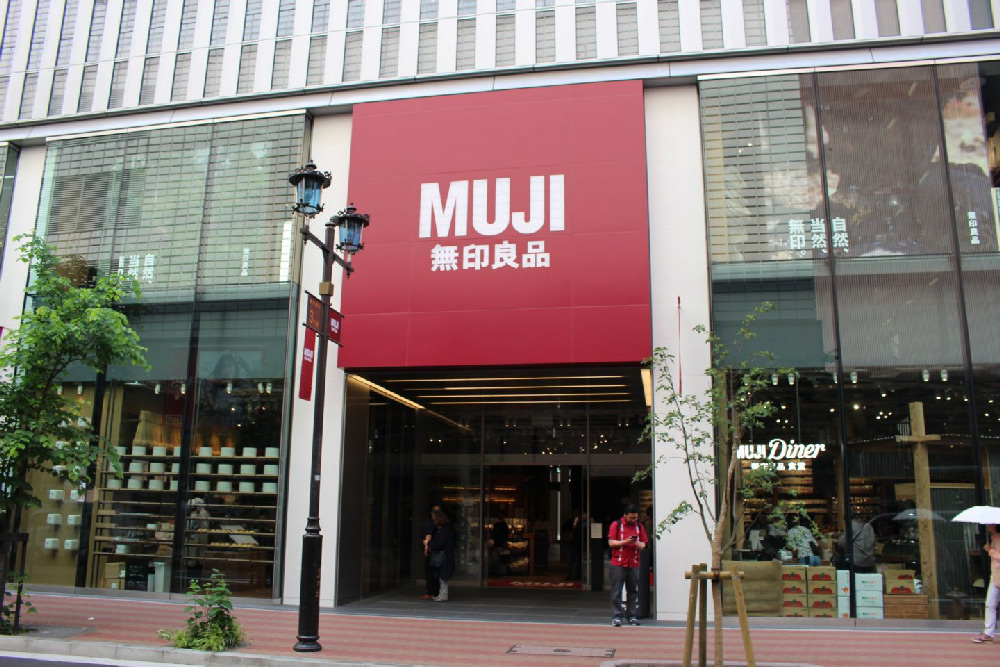
Strategic Store Locations and Designs
MUJI stores are havens of tranquility, strategically located and designed to reflect the brand’s minimalist ethos. These spaces not only attract customers but also serve as a physical extension of the brand’s philosophy.
Cultural Sensitivity and Community Engagement
MUJI's engagement with local communities through cultural and sustainability-focused initiatives demonstrates its commitment to being a responsible and integrated brand in every market it enters.
Marketing Adaptation
While maintaining its understated marketing approach, MUJI adapts its messages to local markets, emphasizing aspects like sustainability or minimalism depending on regional values and trends.
The Role of Digital Platforms
MUJI’s digital strategy complements its physical presence, offering a seamless customer experience that aligns with its global standards and local preferences.
A Balanced Approach to Globalization
MUJI's global presence is a testament to its ability to adapt without losing its foundational values. This balance has enabled MUJI to thrive in the competitive retail space while remaining true to its principles of simplicity, quality, and sustainability.
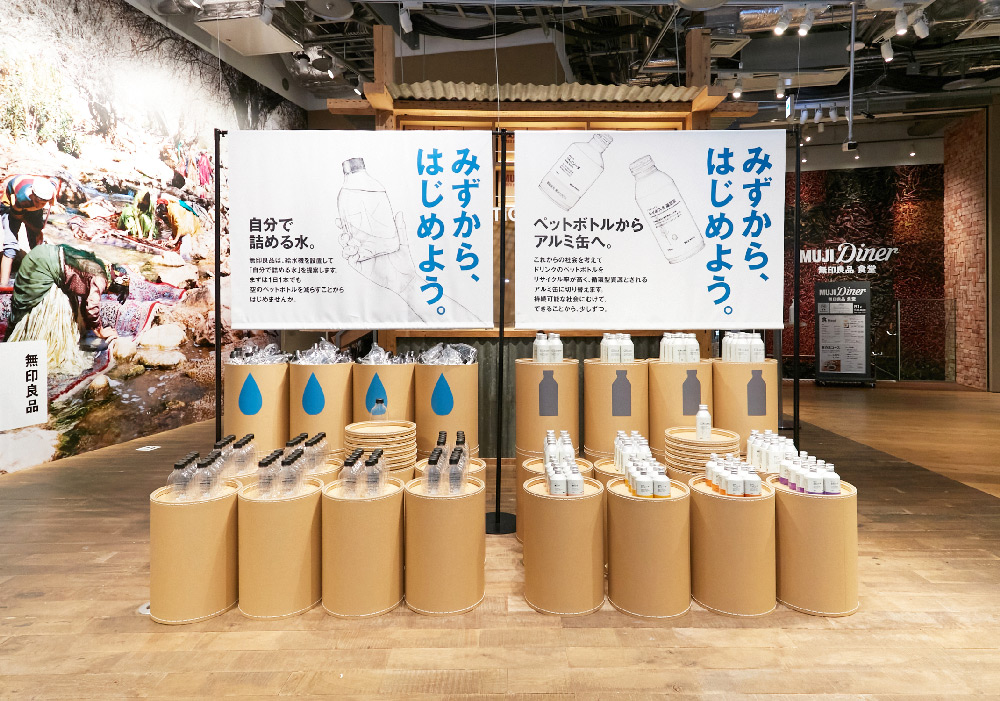
MUJI’s Sustainable Minimalism
MUJI’s philosophy of minimalism and sustainability has not only shaped a unique market niche but has also established it as a forward-thinking global brand. Its approach to globalization, customer engagement, and product philosophy continues to resonate across cultures, proving that simplicity can indeed be the ultimate sophistication.
Market Adaptation Examples
MUJI’s global expansion is highlighted by its ability to adapt to local markets without compromising its minimalist and quality-focused ethos. Here are a few examples:
- In Europe: MUJI introduced items like olive oil and pasta to cater to the local taste, focusing on high-quality, minimalist packaging that resonates with European consumers' preference for understated elegance.
- In the United States: The brand expanded its furniture line to include pieces that suit the typically larger living spaces, incorporating clean lines and functionality that are hallmarks of MUJI’s design.
These adaptations ensure that while the products maintain their minimalist design, they also meet local needs and preferences, demonstrating MUJI's flexible yet consistent branding approach.
Innovations in Retail Experience
MUJI isn't just about products; it’s also about creating a unique retail experience that aligns with its philosophy. The layout of MUJI stores is deliberately simple and functional, which not only reflects the brand’s aesthetic but also enhances the shopping experience:

In-Store Experience
MUJI stores are designed to be calming spaces amid the hustle and bustle of city life. Products are displayed with enough space around them to allow customers to view and interact with the items without feeling overwhelmed. This thoughtful presentation extends to MUJI’s online store, which maintains the same simplicity and ease of navigation.
Technology Integration
Embracing modern technology, MUJI enhances customer interaction through digital means. The MUJI Passport app, for instance, offers features like product scanning and rewards, making shopping interactive and rewarding. This integration of technology ensures that the customer experience is consistent, whether online or in-store.
Financial Performance and Growth
MUJI’s approach to branding and global expansion has not only built a strong identity but also translated into robust financial performance:
Revenue Streams and Market Expansion
Despite its no-brand strategy, MUJI has experienced significant growth across various regions, driven by both its physical stores and an expanding online presence. By effectively combining traditional retail with digital commerce, MUJI continues to reach a broader audience and adapt to changing consumer behaviors.

Continuous Innovation and Future Directions
As MUJI continues to expand globally, it remains committed to innovation and adapting its offerings to stay relevant in a changing market:
Product Development and Innovation
MUJI consistently seeks to innovate within the framework of its core principles. New products are often responses to consumer needs and sustainability trends, such as developing more energy-efficient appliances or expanding its range of organic food products. This commitment to innovation ensures that MUJI remains at the forefront of design and sustainability.
Expanding Digital Footprint
In the digital age, MUJI recognizes the importance of an expansive digital presence. The brand is increasing its investments in e-commerce platforms to streamline the shopping experience, making it easier for customers to access their products globally. This includes enhancing the user interface of their websites and apps to ensure they are as minimalist and functional as the products they sell.
Future Market Expansion Strategies
MUJI’s future strategies involve deeper penetration into existing markets and exploration of new ones. This includes potentially entering markets in Africa and South America, where there is a growing middle class and an increasing appreciation for sustainable and minimalist lifestyles.
Sustainability as a Core Business Strategy
Looking ahead, MUJI plans to integrate sustainability even more deeply into every aspect of its business. This includes achieving higher levels of recycling, reducing water usage in manufacturing processes, and using renewable energy sources more extensively. These initiatives not only reinforce MUJI’s commitment to the environment but also appeal to a consumer base that is increasingly making purchasing decisions based on corporate sustainability.
Enhancing Consumer Connection
MUJI is intensifying efforts to connect with consumers on a more personal level. This involves leveraging social media platforms to engage in direct dialogue with customers, providing them with personalized shopping experiences and insights into MUJI’s product development processes.
Collaborations and Community Partnerships
Collaborations with local artists and designers in various regions continue to be a significant part of MUJI’s strategy. These collaborations help to infuse local cultural elements into MUJI’s products, making them more appealing to local markets while maintaining the global MUJI aesthetic.
Educational Initiatives
MUJI is expanding its in-store and online educational initiatives to help consumers understand the benefits of a minimalist lifestyle and how to integrate sustainable practices into their daily lives. Workshops, webinars, and interactive content are part of MUJI’s strategy to educate consumers about the philosophy behind their products.
A Vision for the Future
MUJI’s vision for the future is clear: to maintain its core values while continuously evolving to meet the needs of a global consumer base. By staying true to its principles of simplicity, quality, and sustainability, MUJI not only enhances its brand appeal but also sets a standard for responsible global retail. The essence of MUJI’s success lies in its unique ability to blend understated branding with impactful business practices, creating a model that other companies strive to emulate.
FAQs
- What does 'Mujirushi Ryohin' mean?
- 'Mujirushi Ryohin' translates to 'no-brand quality goods', reflecting MUJI's focus on quality over branding.
- How does MUJI ensure product quality?
- MUJI uses high-quality materials and adheres to strict manufacturing standards to ensure each product is durable and functional.
- What makes MUJI's marketing strategy unique?
- MUJI uses a minimalist marketing approach, focusing on product quality and store aesthetics rather than traditional advertising.
- How does MUJI promote sustainability?
- MUJI uses eco-friendly materials and processes in its products, encouraging consumers to make sustainable choices.
- What is MUJI's approach to global expansion?
- MUJI balances localization with its universal brand appeal, adapting products to fit local markets while maintaining its core philosophy.
- How does MUJI differ from other retailers in its approach to branding?
- MUJI stands out by minimizing traditional branding elements like logos and slogans, focusing instead on the quality and functionality of its products.
- Can you explain how MUJI's store design impacts customer experience?
- MUJI’s store design is minimalist and functional, creating a serene shopping environment that aligns with its product philosophy and enhances customer satisfaction.
- What role does technology play in MUJI’s strategy?
- Technology at MUJI enhances the customer experience through apps and digital platforms that integrate online and physical shopping, making it convenient and engaging.
- What are some challenges MUJI faces with its global strategy?
- Adapting to different cultural preferences without compromising its minimalist ethos and maintaining a consistent brand identity across diverse markets are challenges MUJI navigates in its global strategy.
- How has MUJI's approach to sustainability influenced its brand reputation?
- MUJI’s commitment to sustainability has strengthened its brand reputation, aligning with the growing consumer demand for eco-friendly and ethically produced products.
- What new product categories might MUJI explore in the future?
- MUJI is exploring more sustainable product options and expanding its range in lifestyle segments such as health and wellness, which aligns with global consumer trends.
- How is MUJI enhancing its online shopping experience?
- MUJI is refining its e-commerce platforms to ensure they are user-friendly and reflect the brand’s minimalist ethos, making online shopping a seamless extension of the in-store experience.
- What are MUJI’s plans for sustainability in the next decade?
- MUJI aims to increase its use of renewable resources, reduce waste, and improve the overall environmental footprint of its products and operations.
- How does MUJI plan to engage with new markets in Africa and South America?
- MUJI plans to tailor its product offerings to meet local needs and preferences, and invest in community engagement and education to build brand awareness.
- What role do collaborations play in MUJI’s global strategy?
- Collaborations with local artists and designers help MUJI integrate local cultural elements into its products, enhancing their appeal while maintaining a cohesive brand identity across markets.
As MUJI continues to redefine the global retail landscape through its seamless blend of simplicity and localized strategy, it stands as a beacon for brands aiming to merge cultural respect with universal appeal. Interested in elevating your own brand with similar strategies? Reach out to us for expert marketing insights and solutions tailored to your needs. Contact us today and let's craft a strategy that places your brand on the global map.

